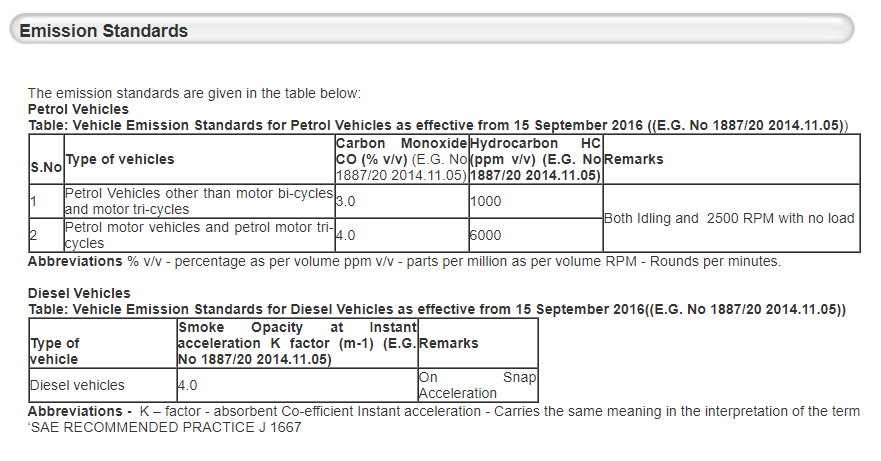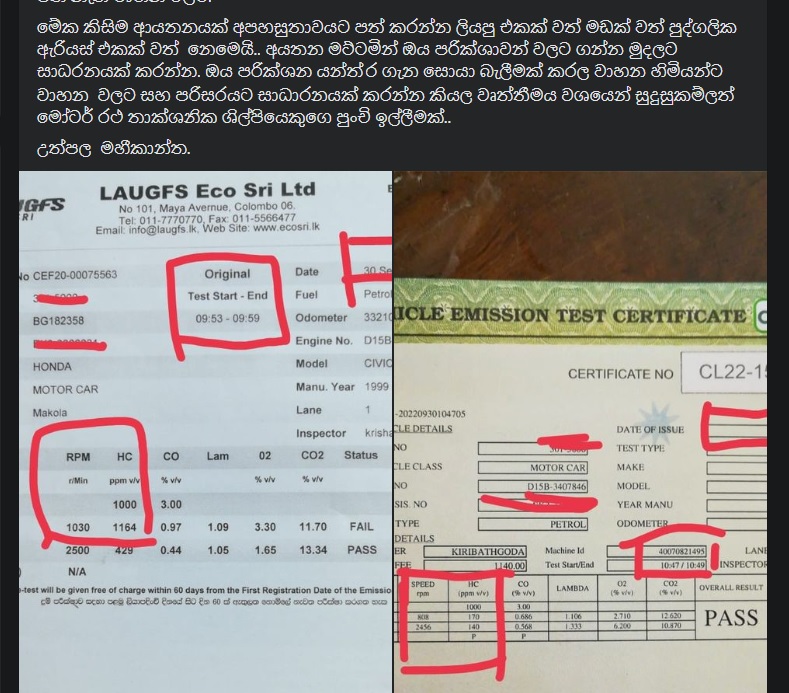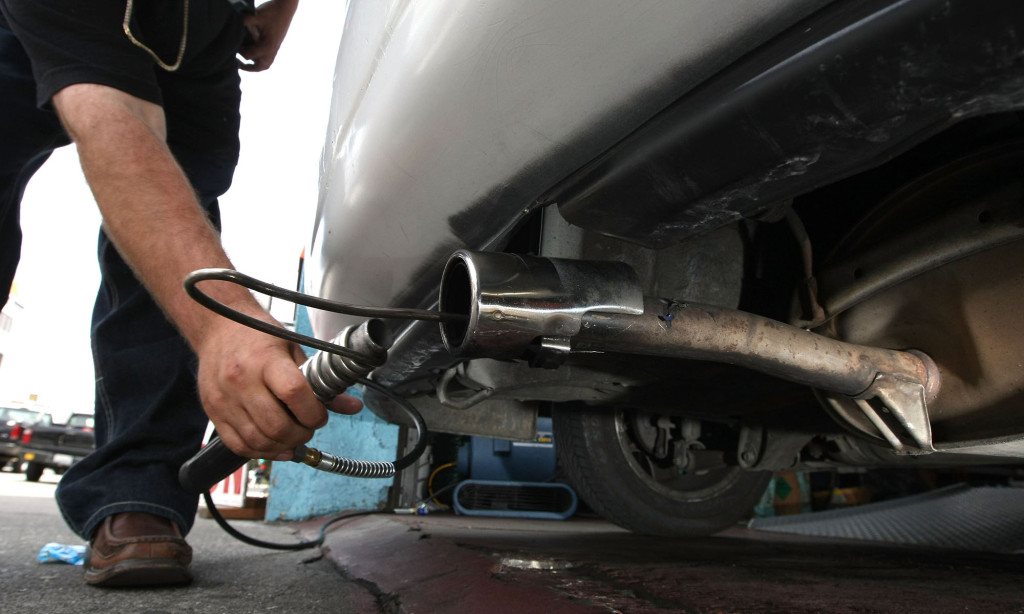ඉඳහිට මතුවෙන, ආයිත් යටයන කතාබහක් තමයි, විමෝචන සහතිකය එහෙම නැත්නම් emission test එකේ තියන අඩුපාඩු, ඒක මුදල් ගසා කෑමක් ලෙස. එමෙන්ම emission test එක මුවාවෙන් විමෝචන ආයතන හිමියන් සහ ගරාජ් හිමියන් පවා වංචා කරන බව කියවෙන. නමුත් මේ බොහෝ වැරදි පෙන්වන්නන් කරන්නේ අඩුපාඩු මුවාවෙන් කිසිදු ප්රමිතියක් නැති තත්වයකට යාම. වරක් ක්රියාත්මක කිරීමට උත්සාහ කල කාබන් බද්ද පවා ඉවත්කර ගත්ත දේශපාලකයින් සහ ජනතාව එක්ව.
ලංකාවේ විමෝචන වායු ප්රමිතීන් සහ ක්රියාදාමය අතිශයින් යල් පැන ගිහින්. මුලින් සුළු වෙනස්කම් වලට භාජනය වුනත් 2014 වසරෙන් පසු යාවත්කාලීන වී නෑ. මේ ප්රමිතීන් ගෝලීය තත්ත්වයන් තබා අවම වශයෙන් යාබද ඉන්දියාවේ තත්ත්වයන් ගෙනුත් බොහෝ පහළ මට්ටමේ. මහජනතාව පමණක් නොවේ, විමෝචන ආයතන හිමියන් සහ මේ සම්බන්ධයෙන් ක්රියාත්මක විය යුතු රාජ්ය ආයතන මේ තත්ත්වය නිවැරදි කිරීම වෙනුවෙන් ක්රියාකාරී ක්රියාමාර්ග අරගෙන නැහැ.
එමෙන්ම හයිබ්රිඩ් මෝටර් රථ පවා මේ වායු විමෝචන සහතිකයෙන් එවත්කර තිබෙනවා ඉතා වැරදි ලෙස. ලොව දියුණු රටවල් හයිබ්රිඩ් මෝටර් රථ භාවිතය තහනම් කරගන යනවා 2030 තරම් මෑතක සිට, විමෝචන වායු ගැටළු නිසාම.

මේ 2022 වසරේ US Department of Energy ප්රසිද්ධකල දත්ත. The CO2 emissions of EV, PHEV, Hybrid, and Gasoline vehicles. Also the impact of the Energy source as well.
Vehicle emissions are divided into two general categories: Air pollutants, which contribute to smog, haze, and health problems; and greenhouse gases (GHGs), such as carbon dioxide and methane. The above evaluation only considers the CO2 emissions, not the rest (PM 2.5) which has become a severe problem in developing countries.
නමුත් මෙහි පවා සැලකෙන්නේ හොඳ තත්වයේ පවත්නා නව වාහන. ලංකාව වැනි පැරණි වාහන භාවිතාවෙන රටවල මේ තත්වය මීට වඩා භයානක වෙනවා.
Emission Policy in Sri Lanka

වාහන හිමියන් රජය සහ විමෝචන ආයතන හිමියන් යන පාර්ශව තුනම බලන්නේ තමන්ගේ වාසිය සහ ලාභ ප්රයෝජන. ඊළඟට විශාල මතවාදයක් ගොඩ නඟාගෙන යනවා ජනතාව සහ රජය පාර්ශ්වයෙන් දැනට පවතින ක්රමවේදත් අවලංගු කරන්න.
දැනට පවතින ක්රමවේදයේ අති විශාල අඩුපාඩු තියෙන බව සත්යයක්. එමෙන්ම මේ ආයතන දෙක ක්රමවේදය පවත්වාගෙන යන්නේ නඩු තීන්දුවක් මත, ඔවුන්ගේ ගිවිසුම්ගත කාලය අවසන් වුණත්.
මේ ආයතනවල ඇති උපකරණවල නිරවද්යතා ගැනත් පැමිණිලි තියනවා. එමෙන්ම ඒවා සුසර කිරීම පිලිබඳ තොරතුරු ඔවුන්ගේ වෙබ් අඩවි වල සොයාගැනීමට නොහැකිවුනා.

ක්රමවේදයේ කොපමණ අඩුපාඩු තිබුණත් කළ යුතු එය අවලංගු කිරීම නොවෙයි. ගෝලීය ප්රමිතීන් සහ අනාගත නිර්ණායක මත නව ප්රතිපත්ති සැකසීම සහ ක්රමවේද සම්මත කර තරගකාරී තත්ත්වයන් යටතේ ආයතන පහක් පමණවත් පත්කර මේ ක්රමවේද ක්රියාත්මක කිරීම.
එමෙන්ම විමෝචන නිරීක්ෂකයන් සහ පරිපාලකයන් ප්රවාහන ව්යාපාර හෝ අලුත්වැඩියා ව්යායාපාර හිමියන් නොවිය යුතුයි. මෙවැන්නක් අතිශය වැරදි ක්රියාමාර්ග වලට මුලපිරීමක් වියහැකියි.
මූලිකම අවශ්යතාවයක් මේ ක්රමවේද සහ බදු තුළින් අය කෙරෙන මුදල් රටේ පරිසරය ආරක්ෂා කිරීම වෙනුවෙන් වෙන අරමුදලකට බැර කර සුදුසු සහ අනුමත ක්රියාමාර්ග සඳහා යෙදවීම. නැතිනම් මෙයින් බලාපොරොත්තු වෙන කිසිදු අරමුණක් ඉටු වෙන එකක් නැහැ.
මේ පිළිබඳව කතා කළ යුතු තවත් බොහෝ දේ තිබුණත් මේ ටික කිව්වෙ මේ දිනවල මතුවුන කරුණු නිසා මෙන්ම ඔබත් මමත් මමත් ආඝ්රාණය කරන වායුව වසරකට රුපියල් බිලියන 800 වන අපේ සෞඛ්ය වියදමෙන් විශාල කොටසකට වගකියන නිසා.
Update
On September 22 of 2022 DMT says they have some fresh hopes, but no improvement to the standards announced! Not even a plan to introduce a system to let us breathe better air!
CO2 based Tax
Many countries are now considering / moving on to newer methodologies like CO2-based taxation on the importation, sales, and usage of motor vehicles. Sri Lanka too should consider such, instead of plastering the long outdated emission policies.
However, a major drawback of this is that it only measures the carbon impact, not the other air pollutants, which contribute to smog, haze, and health problems with particulate matter, PM2.5, etc. Hence a tailpipe emissio evaluation is a must based on EU or at least on India (Bharat) standards.
